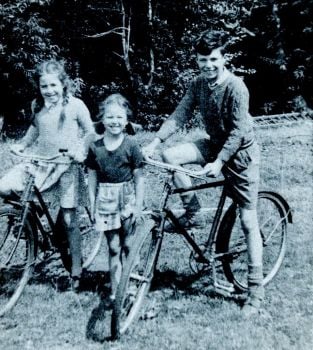Simon Davey – a confusing start in life
Posted on
Last week was ‘Dyslexia week’
This got both of us thinking about how things were for a young Simon in his early life, struggling with a problem that had so far had little if any recognition and wasn’t to be named until twenty years later. We decided that it might be useful for him to share his story and how he coped. There is a different way that dyslexic minds work and one aspect is a brilliance at pattern matching that makes it very helpful in identifying the natural world. It is of little surprise that he chose to be an ecologist by profession.
Simon Davey – a confusing start in life Dyslexia is a condition that I have only been aware that I have since I was a mature adult, as prior to that it had yet to be described by medical science. As a youngster I was simply thought of as being rather unintelligent and treated as such. At the age of eight, I was awarded a choristership at Ely Cathedral. This made me really happy in prospect, but when I went off to the King’s School Ely, I was at first confused, and then utterly miserable. I cried a lot. This did not help me in any way to become accepted by either the teachers or my fellow pupils. In lessons, I was made to sit at the back of the class where I simply made an awful mess on paper with a dip pen and a supply of ink. The teacher took very little, if any notice of me. I was treated as the lowest of the low, and halfway through the first term, I was sent to see a psychiatrist to see if I was mentally ill and unstable. I even spent one night in the town with total strangers - I had run away as life had become quite intolerable. I did have rather a good voice, but I was told that there were occasions when I totally wrecked evensong by sobbing.
Dyslexia is a condition that I have only been aware that I have since I was a mature adult, as prior to that it had yet to be described by medical science. As a youngster I was simply thought of as being rather unintelligent and treated as such. At the age of eight, I was awarded a choristership at Ely Cathedral. This made me really happy in prospect, but when I went off to the King’s School Ely, I was at first confused, and then utterly miserable. I cried a lot. This did not help me in any way to become accepted by either the teachers or my fellow pupils. In lessons, I was made to sit at the back of the class where I simply made an awful mess on paper with a dip pen and a supply of ink. The teacher took very little, if any notice of me. I was treated as the lowest of the low, and halfway through the first term, I was sent to see a psychiatrist to see if I was mentally ill and unstable. I even spent one night in the town with total strangers - I had run away as life had become quite intolerable. I did have rather a good voice, but I was told that there were occasions when I totally wrecked evensong by sobbing.
Then, at the age of ten, I went up a form, and in this class we started to learn Latin. Latin seemed very simple. All we had to do was to learn the declensions and conjugations of nouns and verbs. Amo amas amat etc.! To the total astonishment of my teachers, I did not make any mistakes in Latin. As a result, I was top of the class, although still well bottom in all other subjects. My reading ability was not good, but I found that I could make a very neat job of Latin work. Everyone was astonished, and I was sent to show my work to the headmaster who I think was equally astonished.
At the age of thirteen, two more new subjects were added. These were chemistry and French. My French was adequate, but in chemistry which I adored, I made virtually no mistakes and was top of the class. This was in spite of the fact that in my first term I had spent a considerable amount of time in the school sanatorium, and this was in a building in which the chemistry master had a flat. He had no respect for me even this much later, and I think he found it difficult to accept the fact that my chemistry was very promising. Because I was now rather outstanding in two subjects, adequate in one other and bottom in the rest, my end of term reports said that I was ‘idle and lazy’.

